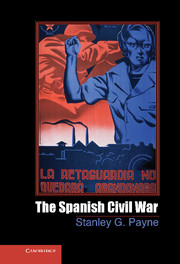Book contents
- Frontmatter
- Contents
- Chronology of Major Events
- Glossary
- Preface
- Introduction Civil War in Twentieth-Century Europe
- 1 Modernization and Conflict in Spain
- 2 From Revolutionary Insurrection to Popular Front
- 3 The Breakdown of Democracy
- 4 The Military Insurrection of the Eighteenth of July
- 5 The Battle of Madrid – the First Turning Point
- 6 Revolution
- 7 Terror
- 8 A War of Religion
- 9 Franco's Counterrevolution
- 10 Foreign Intervention and Nonintervention
- 11 Soviet Policy in Spain, 1936–1939
- 12 The Propaganda and Culture War
- 13 A Second Counterrevolution? The Power Struggle in the Republican Zone
- 14 The Decisive Northern Campaigns of 1937–1938
- 15 The War at Sea and in the Air
- 16 Civil Wars within a Civil War
- 17 The War in Perspective
- Conclusion Costs and Consequences
- Select Bibliography
- Index
- References
16 - Civil Wars within a Civil War
Published online by Cambridge University Press: 05 September 2012
- Frontmatter
- Contents
- Chronology of Major Events
- Glossary
- Preface
- Introduction Civil War in Twentieth-Century Europe
- 1 Modernization and Conflict in Spain
- 2 From Revolutionary Insurrection to Popular Front
- 3 The Breakdown of Democracy
- 4 The Military Insurrection of the Eighteenth of July
- 5 The Battle of Madrid – the First Turning Point
- 6 Revolution
- 7 Terror
- 8 A War of Religion
- 9 Franco's Counterrevolution
- 10 Foreign Intervention and Nonintervention
- 11 Soviet Policy in Spain, 1936–1939
- 12 The Propaganda and Culture War
- 13 A Second Counterrevolution? The Power Struggle in the Republican Zone
- 14 The Decisive Northern Campaigns of 1937–1938
- 15 The War at Sea and in the Air
- 16 Civil Wars within a Civil War
- 17 The War in Perspective
- Conclusion Costs and Consequences
- Select Bibliography
- Index
- References
Summary
“Civil war within the Civil War” has become a cliché about the internal conflicts of the revolutionary Republic, yet such strife had been inherent in Spanish left-liberalism from its beginning more than a century earlier. Even more severe internal strife had characterized the left-liberal side in the two civil wars of the nineteenth century. During the First Carlist War (1833–40) two different new constitutions had been introduced, the second of them preceded by violent intra-liberal clashes that overthrew the government, whereas in the Second Carlist War (1869/73–76), there had been two complete changes of regime, the first accompanied by numerous provincial insurgencies, partially modeled on the Paris Commune.
The Second Republic was always prone to severe conflict, violent rebellion by Republicans antedating the Republic itself. The Republican coalition initially launched a military pronunciamiento against the government of Alfonso XIII in December 1930, not during the dictatorship but during the period in which the monarchy was moving, however slowly, toward new elections. There followed the four revolutionary insurrections of 1932–34, the pre-revolutionary insurgency of the spring of 1936, and the conflicts within the Civil War itself. For the Republicans, as Edward Malefakis has written, the Civil War was less the simple morality play that Republican propaganda strove to present than it was “Greek tragedy or modern drama, with their portrayal of the protagonist as his own chief enemy, unable to triumph because he is unable to gain ascendancy over himself.” Negrín's correspondence after the Civil War seems to have agreed with such an assessment.
- Type
- Chapter
- Information
- The Spanish Civil War , pp. 216 - 230Publisher: Cambridge University PressPrint publication year: 2012



